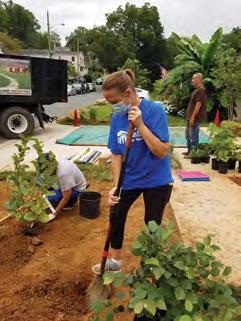
3 minute read
Fauquier Habitat Keeps Building For Future
By Darryl Neher Chief Executive Officer Fauquier Habitat for Humanity

Volunteers and future homeowners help put the finishing touches on a Fancier Habitat for Humanity property.
Advertisement
First of Two Parts
The past year has proven challenging for one and all. A global pandemic. Political and social division. Economic uncertainty. But despite these unprecedented challenges, Fauquier Habitat for Humanity (FHFH) continued its work to ensure our neighbors have a safe, affordable, and decent place to live.
In Fauquier and Rappahannock counties, affordable housing inventory cannot meet current Volunteers and future demand. Affordable properties are seeing their homeowners help put the price increase at two times the median-priced finishing touches on a Fanhome rate nationally. Developers interested in cier Habitat for Humanity building affordable homes confront high land cost, property. pricey infrastructure, and zoning requirements making it difficult to construct a truly affordable home.
Fauquier Habitat has been working within the community to meet these challenges for nearly 30 years. Why? Home ownership creates long-lasting and a life-changing impact on families and communities, from providing a source of wealth and asset-building to influencing health and educational outcomes and contributing to positive community development.
Innovation and partnership marked FHFH’s efforts in 2020, but more is needed to help address the region’s affordable housing shortage. We can’t do this alone; the key to building sustainable, long-term affordable housing options requires strong community partnerships and willingness to embrace innovative and creative solutions.
We’ve developed several programs that expand our ability to serve local residents.
One involves keeping people safe in their homes with critical home repair programming. FHFH has signed a memorandum of understanding with the Rappahannock Benevolent Fund to partner on home repair projects in Rappahannock County. Thus far, the organizations have completed 16 projects, with two larger critical home repair projects scheduled to begin in 2021. FHFH is currently piloting a similar program in Fauquier County, focusing on an agingin-place project.
We also have partnership and new homeowner education programs.
For the first time since 2016, FHFH welcomed three families into our homeownership program. Families are eligible after demonstrating a need for housing, an ability to pay and willingness to partner with FHFH.
A partnership is built through contributing “sweat equity” hours to Habitat’s mission and actively engaging in the homeowner preparedness course curriculum. Sweat equity takes the place of a traditional down payment.
Every adult in a future homeowner family earns sweat equity hours by volunteering at the ReStore, working with core construction volunteers on current projects, and doing administrative/support work.
A new educational program is designed to better prepare our partners for homeownership. Initial classes focused on financial literacy and planning, delivered by our partners at The Fauquier Bank. Future courses will cover home maintenance and repairs, how to be a good neighbor, and the importance of community engagement.
In the traditional Habitat model, we build a home, sell it to a qualifying family, who then pays the mortgage and lives in the home.
While FHF holds the right of first refusal to purchase a home back if it is going to be sold, the cost is often too high, and the home is sold at market rate, further reducing affordable housing inventory. In the fall of 2019, Fauquier Habitat initiated a plan to protect our inventory of affordable homes through the creation of a community land trust.
Typically, that trust sells the houses on the land or builds new residences. FHFH retains ownership of the land while providing a 99-year renewable land lease for a nominal fee to the homeowner. By subtracting the cost of the land from a home purchase, the community land trust makes homeownership a possibility.
Next: Plans for 2021










